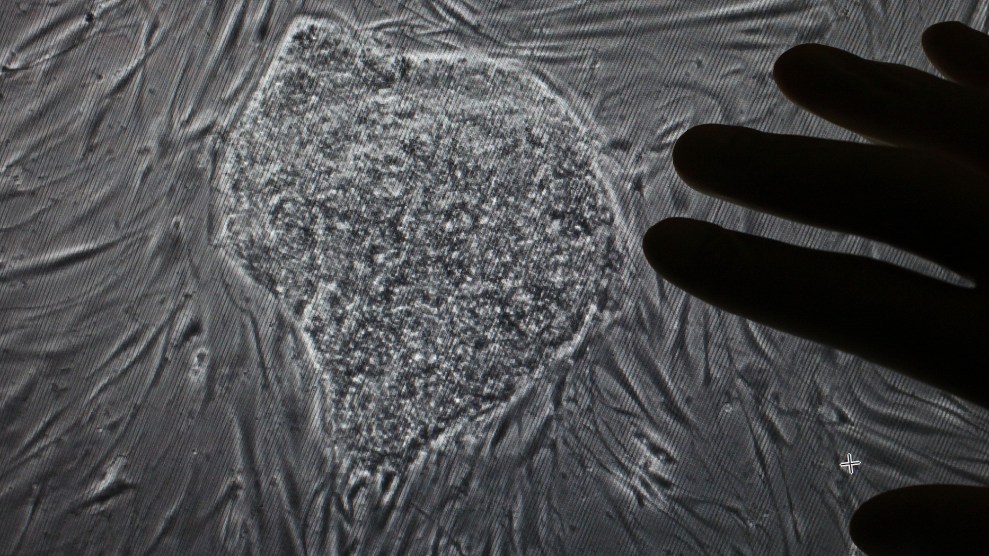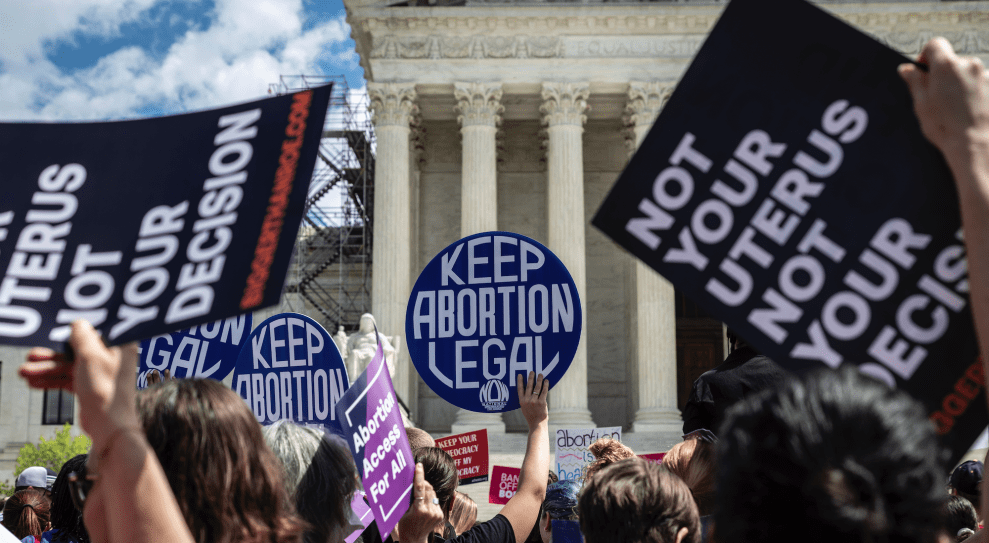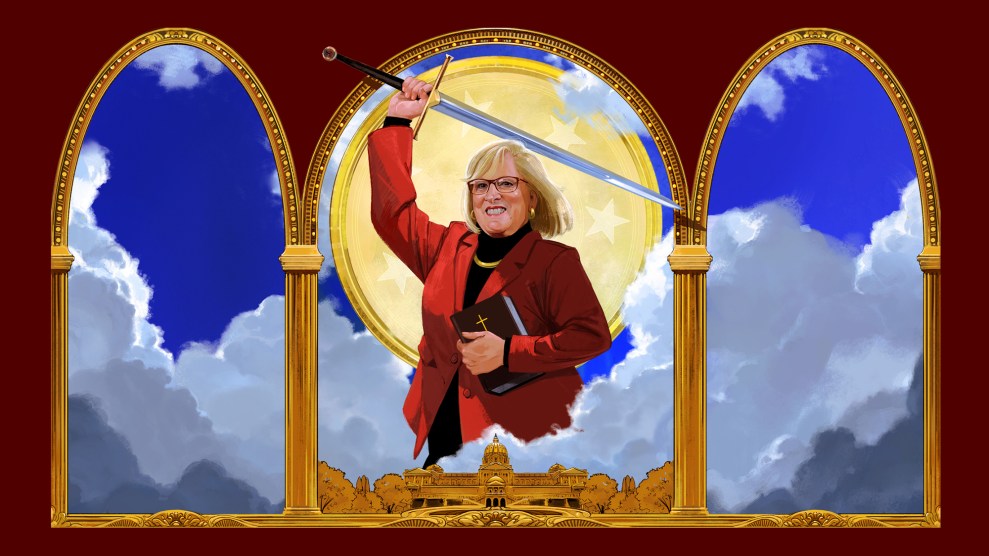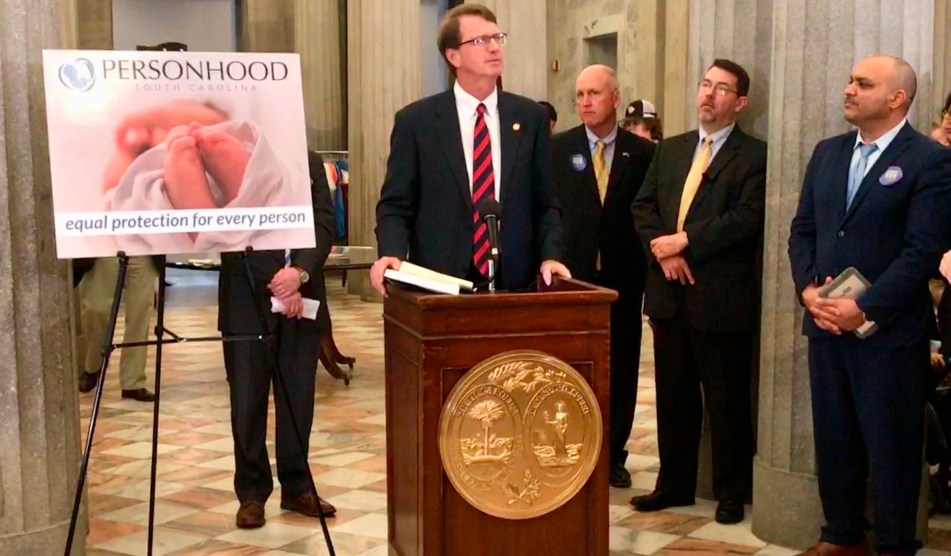
San Francisco Chronicle/Hearst Newspapers via Getty Images
In ruling that frozen embryos should be legally considered the same as children under a wrongful death law, the Alabama Supreme Court furthered a growing movement hoping to enshrine “fetal personhood”—the idea that a fetus or embryo should have the same rights as a child—into law.
In Alabama, one consequence of such a doctrine became clear immediately. In the days following the decision, multiple in vitro fertilization, or IVF, clinics in the state paused their services over concerns that they could be prosecuted for disposing of unused embryos. But enacting fetal personhood to curtail abortion adds more complexities than hindering IVF. If a fetus is a child, what does it mean for miscarriages? What happens with tort law—can a fetus’ estate sue for harm?
Republicans seemed to openly admit that they had not considered what fetal personhood could entail. “I’m not sure everybody has really thought about what all the potential problems are,” Texas Governor Greg Abbott admitted after the Alabama ruling. (Soon after, Florida delayed a law giving an “unborn child” new protections.)
Dr. Michele Bratcher Goodwin has been writing about embryos, fetal personhood, and the criminalization of pregnancy for decades. Her book, Policing the Womb, published before the fall of Roe v. Wade, details how states can abuse laws and infringe on civil rights to police reproductive freedom. Dr. Goodwin, who is currently a constitutional law and global health policy professor at Georgetown Law, and I spoke about the court’s decision in Alabama and what it means if fetal personhood is enacted.
Were you surprised by the Alabama Supreme Court’s ruling?
No. For a very long time, I’ve not been surprised.
It’s been probably close to 20 years since I first made trips to Alabama and began looking at the anti-abortion movement. The personhood efforts have intensified over the last 15 years or so.
I’m curious what other ramifications about fetal personhood you see happening that maybe aren’t so blatant?
It’s undeniable we could see policing of reproduction. Think about Brittany Watts and her toilet being busted open and police searching through fecal and fetal remains to see if she had a miscarriage.
Now, also think about with this Alabama ruling, where the court says embryos are children: What does that mean for a woman in a relationship?
We know that the risk of domestic violence is intensified when a person is pregnant. We’ve also seen that in the wake of anti-abortion lawmaking, there have been boyfriends and husbands who have acted in abusive and criminal ways, believing that they have some authority over the bodies of the women in their lives. [Fetal personhood] creates an atmosphere where any time in which a pregnancy may not occur when sex has occurred, there is the presumption or question: Did she do something to cause menstruation?
Consider that in Burwell v. Hobby Lobby Stores, the Supreme Court basically said that IUDs and Plan B are abortifacients [a substance used to terminate a pregnancy]—which they are not, they’re contraception. When you combine the Supreme Court’s ruling in that case, along with this Alabama case, then you get this nightmare situation where the presumption ends up being that an abortion is taking place…
Immediately after sex.
That’s right. The idea is that a pregnancy is taking place immediately after sex. And if that pregnancy isn’t sustained, well, then something must have happened. She must have done something and we need to investigate.
This seems far-fetched in the way that the slow fall of Roe seemed far-fetched.
In the same way that I wrote an article published seven years ago, “If Embryos and Fetuses Have Rights.” I talked exactly about the moment that we’re in. I can’t make it up.
What we see in a decision like this is this alarming disregard for the constitutional citizenship of women, but also more than that, it means a disregard for the lives of the most vulnerable people who most cry out for civil liberties and civil rights and to be respected under the law. It’s LGBTQ couples who are also vulnerable here. It’s women who lack fertility who are implicated in this. And in terms of criminal policing, the communities that are more likely to be surveilled, more likely to experience the harshest blows of the law, are always, unfortunately, going to be poor people. And amongst them women of color.
What’s interesting in Alabama that has been going on for not quite a generation, but nearly so, is this prurient policing of poor white women, which has largely been ignored, but which I’ve written about—these are vulnerable white women who do not have political clout, who are not wealthy. And they’ve come under intense, intense scrutiny by prosecutors.
There’s been a lot less noise about heavily policed groups of women, both in Alabama and nationally, being charged with things like child endangerment or feticide. What do you make of the difference in attention given to the Alabama Supreme Court ruling?
IVF has been a resource available to people who have usually been more wealthy, educated, and white—and who’ve been able to have access to these technologies. And in some ways, what one sees in the wake of this ruling has been political elites who’ve been articulating their discontent with this case. Because they are constituents that are listened to. They themselves have utilized these technologies. That’s quite distinct from ignoring the concerns of people who are not the elites, the people who are poor and suffering under the weight of this kind of harsh pronatalism that we see in the United States.
Over the past week, we’ve seen pushback from all sides of the political spectrum. Republicans have been saying: We ought not to be going after people with fertility issues who want to get pregnant. Why such a broad outcry? And why this ruling?
Infertility does not have a political party. Being LGBTQ and needing assisted reproductive technologies is not a political party. Being older and wanting to start a family does not have a political party. When one understands that, then you can see why there has been pushback across myriad areas.
Nikki Haley has come forward to say that she needed to use assisted reproductive technologies for the birth of her son. The Chief Justice John Roberts and his family did not conceive biological children. Mike Pence has come forward expressing that his family utilized these technologies. It exposed how harmful the rule that embryos are children is and that it might make it difficult for families to utilize these technologies. One could see that immediately with various campuses shutting down their IVF clinics and organizations saying that they would not ship cryopreserved embryos to and from the state.
What else is on your mind right now?
The chilling effect.
For example, if one thinks about the era of Jim Crow and the civil rights movement, if a state has said, Okay, we’ve done away with laws that ban your ability to go in the parks and ban your ability to go into swimming pools. But we’re going to have armed guards and police officers studying your every move. It was understood that there’s a chilling effect. Even though you’ve now said it’s legal to walk into the school, we’re going to have guards and guns pointed at you while you try to walk into the school.
We have to worry about now the chilling effect—that even when there should be legal protections, when they may exist on paper, they may be more illusory than real. What then are those reproductive freedoms if it comes at the cost of being policed, experiencing vulnerability, and the risks of punishment?
This interview has been edited for length and clarity.














